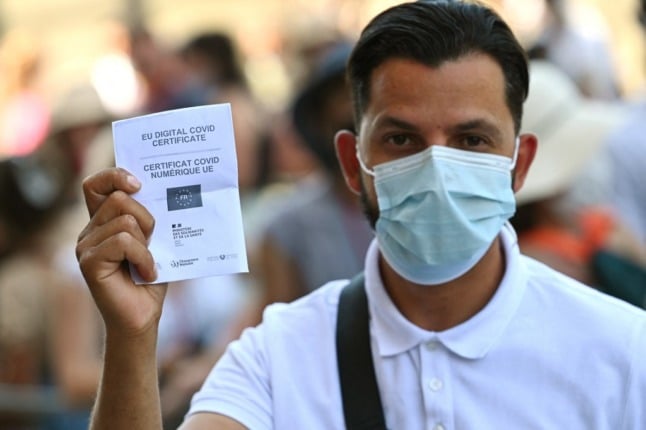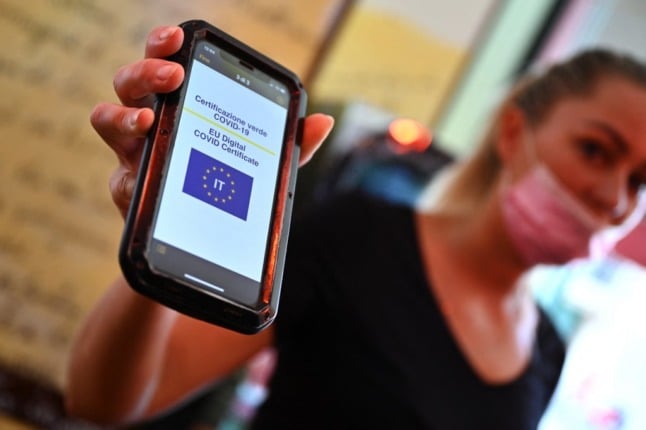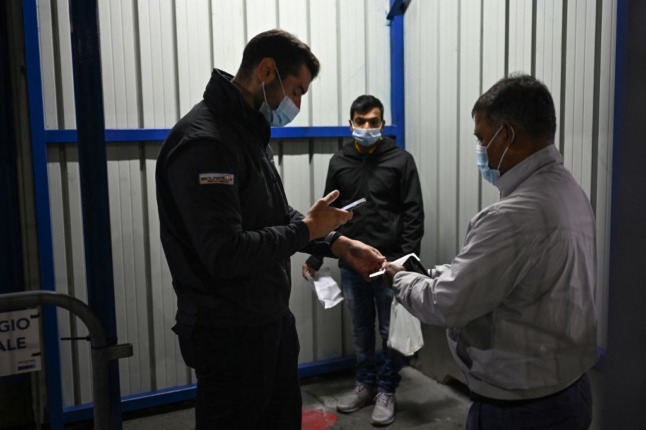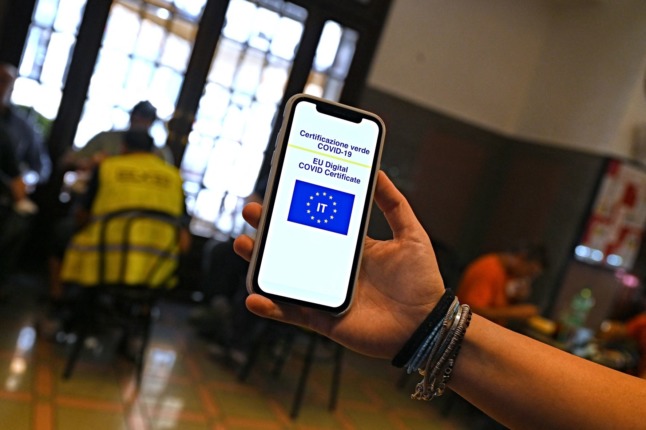Italian citizens who were vaccinated or recovered from Covid-19 outside Italy, their family members, and anyone registered with the national health service in Italy can now convert their foreign certificates into Italian ones and use them to apply for an Italian health passport for use throughout the European Union.
It’s not obligatory to do so, and for some Italians living abroad it wouldn’t make much of a difference: since Covid certificates from any EU country are valid throughout the bloc, anyone who recovered or got vaccinated elsewhere in the EU does not need the Italian version of the health passport – Italy’s so-called ‘green pass’.
Q&A: Your questions answered about Italy’s new Covid health pass
In addition, Italy has also promised to accept equivalent documents from Canada, Israel, Japan, the UK and the US – though reports from The Local’s readers suggest that some venues in Italy have been rejecting certificates from these countries amid confusion over which non-EU documents are recognised.
For Italian nationals who want the security of having a local certificate, or for those vaccinated in a different country outside the EU, there is a way to log your shots (or recovery) with the Italian health service – though be warned, it cannot be done from overseas.
Who is eligible to convert their foreign certificates of vaccination or recovery in Italy?
According to a Health Ministry circular of August 4th, the option is open to all Italian citizens, as well as any family members who live with them.
That includes Italians who do not live in Italy and who are not enrolled in the Italian public health service.
READ ALSO: ‘Be tenacious as hell’: How people in Italy have managed to get vaccinated without a health card
The circular also states that “all subjects registered with the National Health Service on any basis” are eligible to convert foreign vaccination or recovery certificates in Italy.
That suggests that non-Italians who live in Italy and are enrolled in the public health system, but got vaccinated elsewhere, can have their jabs added to their Italian health records.
Some local health office websites appear to state that this is the case, such as that of ATS Bergamo:
“Italian citizens (also residing abroad) and their cohabiting family members, regardless of whether they are registered with the National Health Service, as well as all subjects registered for any reason with the National Health Service, who have been vaccinated abroad against SARS-CoV-2 or who have recovered from Covid-19 abroad, may request a Covid-19 green certifications for vaccination or recovery, issued by the national platform.”
Which Covid-19 vaccines does Italy accept?
Italy will only recognise your shots if you received a Covid vaccine that is approved by EU and Italian regulators.
Currently that includes four vaccines:
- Comirnaty (made by Pfizer-BioNTech)
- Spikevax (Moderna)
- Vaxzevria (AstraZeneca)
- Janssen (Johnson & Johnson)
What proof of vaccination do you need?
You’ll need an official certificate that gives the following details:
- Your full name
- Your date of birth
- Name and batch number of vaccine
- Date(s) you got your jab(s)
- Details of the authority that issued the certificate, such as your country’s national health service, ministry of health or local health authorities.
The document should be in Italian and/or English (German is also accepted in the bilingual province of Bolzano). If it’s in any other language, you’ll need to provide a certified translation.

What proof of recovery can you show?
People who recovered from Covid-19 within the past six months can show a medical certificate containing the following information:
- Your full name
- Your date of birth
- The date you first tested positive for coronavirus via molecular (PCR) test
- Details of the health authority that issued the certificate.
How can you convert a foreign certificate into an Italian green pass?
First things first: you have to do it in Italy. So people looking to do it in advance of a trip will have to make sure they have all the documents they need to cross the border, then obtain a green pass after they arrive. (Italy previously allowed public servants posted overseas to convert their foreign certificates at Italian embassies and consulates abroad, but this only applied to diplomats, people in the military and others employed by the Italian state.)
The Health Ministry does not provide detailed instructions, and the exact procedure will vary from region to region.
READ ALSO:
- Where do you need to show a Covid ‘green pass’ in Italy?
- What documents can non-EU visitors use as a Covid pass in Italy?
- What can you still do in Italy without a Covid-19 ‘green pass’?
You should contact the local health authority (Azienda Sanitaria Locale or ASL) for the part of Italy where you’re based, who will provide further information about the documents you should provide and how. The ASL will check your documents are genuine and valid, then log the details in their records.
Once you’re registered as vaccinated or recovered, the Ministry of Health should generate an authorisation code and send it to you by text or email. You can then use your code to download a green pass using the official website, www.dgc.gov.it. Find a complete guide here.
Can you get an Italian green pass after getting one vaccine dose abroad?
Yes: Italian nationals can register their first dose with Italy’s health service and, under the rules that make the green pass available 15 days after your first jab, claim a certificate that will remain valid until they’ve received their second shot.
But you must complete the procedure before you should have received your second shot, according to Italy’s timeframes – so no more than 42 days after your first dose of the Pfizer or Moderna vaccines, or 84 days for AstraZeneca.
Meanwhile people who only received one of two doses because they had recently recovered from Covid-19 should present both their certificates of recovery and vaccination to be registered as fully vaccinated in Italy.




 Please whitelist us to continue reading.
Please whitelist us to continue reading.
Member comments